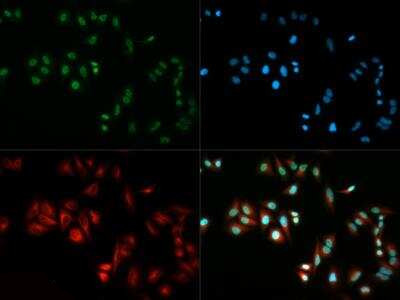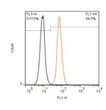HP1 alpha (CBX5) Rabbit Polyclonal Antibody
USD 436.00
USD 200.00
USD 867.00
Specifications
| Product Data | |
| Applications | FC, ICC/IF, WB |
| Recommended Dilution | Flow (Intracellular): 1:500, Western Blot: 1:500 - 1:1000, Immunocytochemistry/ Immunofluorescence: 1:500 |
| Reactivities | Human |
| Host | Rabbit |
| Isotype | IgG |
| Clonality | Polyclonal |
| Immunogen | A synthetic peptide containing an N-terminal region of human HP 1 alpha (within residues 1-100). [Swiss-Prot P45973] |
| Formulation | PBS and 0.02% sodium azide |
| Concentration | lot specific |
| Purification | IgG purified |
| Conjugation | Unconjugated |
| Storage | Store at -20°C as received. |
| Stability | Stable for 12 months from date of receipt. |
| Gene Name | chromobox 5 |
| Database Link | |
| Background | Heterochromatin protein-1 (HP1) is a methyl-lysine binding protein localized at heterochromatin sites, where it mediates gene silencing. It has been shown that mammalian methyltransferases that selectively methylate histone H3 on lysine-9 generate a binding site for HP1 proteins, a family of heterochromatic adaptor molecules implicated in both gene silencing and supranucleosomal chromatin structure. High-affinity in vitro recognition of a methylated histone H3 peptide by HP1 requires a functional chromodomain. Thus, the HP1 chromodomain is a specific interaction motif for the methyl epitope on lysine-9 of histone H3. In vivo, heterochromatin association of HP1 proteins is lost in Suv39h double-null primary mouse fibroblasts but is restored after reintroduction of a catalytically active SUV39H1 HMTase. A molecular mechanism through which the SUV39H-HP1 methylation system can contribute to the propagation of heterochromatic subdomains in native chromatin has been defined. It has been demonstrated that HP1 can bind with high affinity to histone H3 methylated at lysine-9 but not at lysine-4. The chromodomain of HP1 as its methyl-lysine-binding domain has been identified. A point mutation in the chromodomain, which destroys the gene silencing activity of HP1 in Drosophila, abolished methyl-lysine-binding activity. Genetic and biochemical analysis in S. pombe showed that the methylase activity of Clr4 (the SUV39H1 homolog) is necessary for the correct localization of Swi6 (the HP1 equivalent) at centromeric heterochromatin and for gene silencing. A stepwise model for the formation of a transcriptionally silent heterochromatin: SUV39H1 places a methyl marker on histone H3, which is then recognized by HP1 through its chromodomain has been suggested. This model may also explain the stable inheritance of the heterochromatic state. SUV39H1 and HP1 are both involved in the repressive functions of the retinoblastoma protein. Rb associates with SUV39H1 and HP1 in vivo by mean |
| Synonyms | HEL25; HP1; HP1A |
| Reference Data | |
Documents
| Product Manuals |
| FAQs |
| SDS |
{0} Product Review(s)
Be the first one to submit a review






























































































































































































































































 Germany
Germany
 Japan
Japan
 United Kingdom
United Kingdom
 China
China





